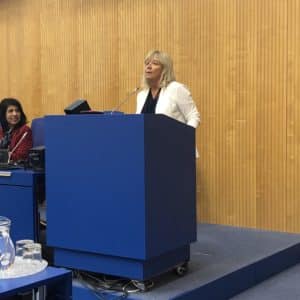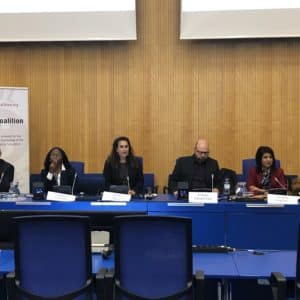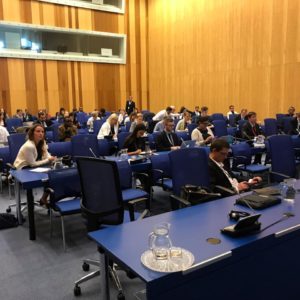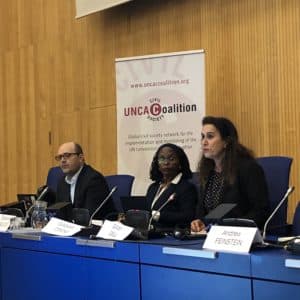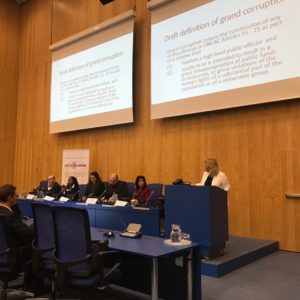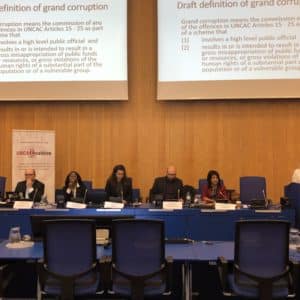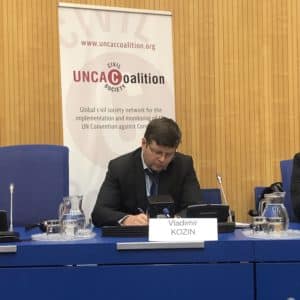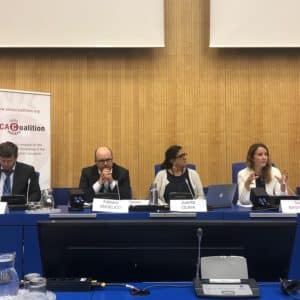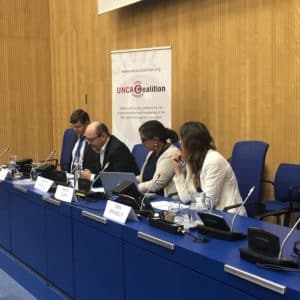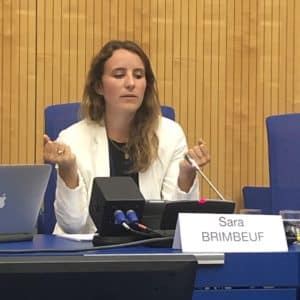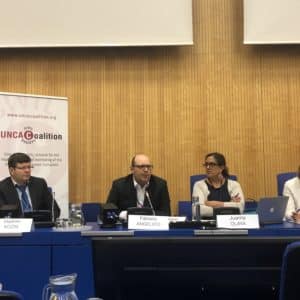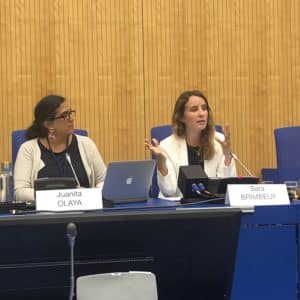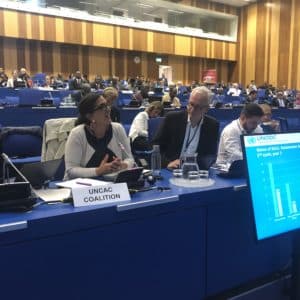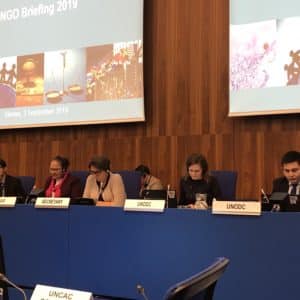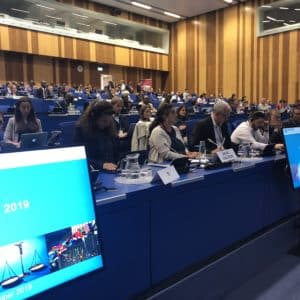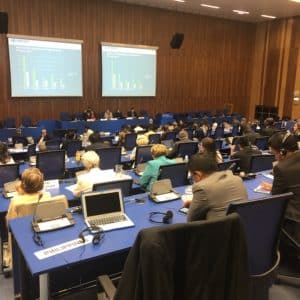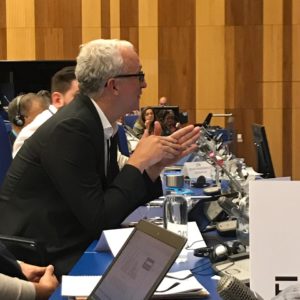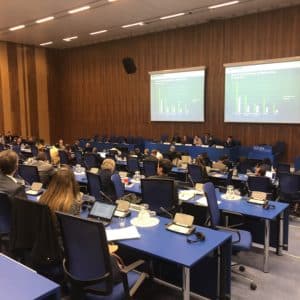Tenth resumed session of the Implementation Review Group (10th IRG)
Vienna, 2–4 September 2019
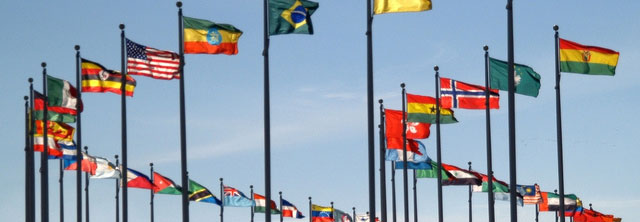
The 10th resumed session for the Implementation Review Group (IRG) for the UN Convention against Corruption (UNCAC) took place from 2–4 September 2019 at the UN in Vienna.
The three main agenda items are a review of the implementation of the Convention, the performance of the review mechanism, and technical assistance to enhance countries’ implementation efforts.
The IRG Briefing for NGOs is a pendant to the main IRG meeting and took place on 3 September 2019 at 15:00.
Special Events on 3 September 2019
As part of the NGO Briefing, two thematic panel discussions were organised by the UNCAC Coalition:
Grand Corruption Cases – What schemes and what consequences?
Tuesday, 3 September 2019, 13:30 – 15:00
Room: VIC M Building, Room M3
Organisers: Transparency International and UNCAC Coalition
Moderator: Gillian DELL, Transparency International Secretariat
Panellists:
- Cynthia GABRIEL, Member of the UNCAC Coalition’s Coordination Committee, Center to Combat Corruption and Cronyism (C4 Center), on 1 MDB
- Andrew FEINSTEIN, Corruption Watch UK, on BAE weapons sales
- Fabiano ANGELICO, Consultant and Researcher, Transparency International Brazil, with a presentation on Lava Jato
- Gladwell OTIENO, Executive Director, Africa Centre for Open Governance (AfriCOG) in Kenya, on their recent report on state capture and the difficulties of fighting corruption in an East African country
Background: Grand corruption, involving high-level officials, has serious and often global effects, including egregious violations of human rights. It is often aided and abetted by networks of major financial institutions and shell companies, supported by legions of lawyers and accountants. Furthermore, in grand corruption cases, domestic authorities are often unable or unwilling to bring the perpetrators and their accomplices to justice, despite having a legal framework to combat corruption.
High-level actors are able to vitiate their national judicial systems and shield themselves from the rule of law. These challenges may mean the perpetrators are never held to account. A recent report from the Egmont Group of Financial Intelligence Units observes that: “In some countries, it is difficult to investigate and prosecute high-ranking politicians, and such cases may illustrate the actual level of autonomy and operational independence of the FIU.” In such cases, combatting grand corruption must be the responsibility of the international community.
Objectives: This special event aimed to advance UNCAC States Parties’ discussions on grand corruption by reflecting on the lessons learned from several major cases of grand corruption, including with respect to the role of the financial escort and shell companies. It also presented and sought feedback on the elements of a definition of the criminal offence of grand corruption.
Repairing the Damage: Redress for Victims of Corruption
Tuesday, 3 September 2019, 17:00 – 18:00
Room: VIC M Building, Room M3
Organiser: UNCAC Coalition
Moderator: Juanita OLAYA, Chair, UNCAC Coalition
Panellists:
- Fabiano ANGELICO, Consultant and Researcher, Transparency International Brazil, on options and mechanisms
- Sara BRIMBEUF, Advocacy Officer – Stolen assets restitution, Transparency International France, on reparations and the reform of the French legal framework
- Vladimir KOZIN, Crime Prevention and Criminal Justice Officer, UNODC/StAR, on best practices for the identification and compensation of different types of victims in accordance with the Convention, third-party challenges and their impact on asset recovery under Chapter V
> Outline of the event (PDF)
> Notes from the side event on victim redress (PDF)
Background: Many countries are stepping up national and transnational law enforcement efforts to bring parties involved in corruption to justice. In both the national and international contexts, the question of victims’ redress and the reparation of damages is critical.
While several countries are piloting and developing solutions, no single approach so far has proven to be flawless. Challenges in the reparation process are abundant. There is an increasing need by all parties for an exchange on options and alternatives, and a forum for learning.
Objectives: This meeting sought to facilitate an expert discussion on approaches and best practices for addressing redress for the damage caused by corruption in line with UNCAC Art. 34 and 35, and with this the identification of different types of victims of corruption and the establishment of mechanisms for compensation and redress.
UNODC NGO briefing
Tuesday, 3 September 2019, 15:00 – 17:00
Room: VIC M Building, Boardroom A
UNODC presentation with breaks for questions from NGOs between the thematic segments of the presentation; NGO statements and reports with questions from the plenary.
Written submissions by NGOs
The IRG sessions are open to UNCAC signatory states and intergovernmental organisations. Civil society organisations have not been permitted to participate as observers, due to opposition from a small but influential group of countries. This is problematic and inconsistent with international human rights standards, Goal 16 of the Sustainable Development Goals and with transparency and participation standards in the Convention itself.
Instead of including civil society representatives in its meetings, since 2011, the IRG holds a Briefing for non-governmental organisations (NGOs). During these briefings, UNODC provides representatives of civil society organisations with information on the status of the review process and review discussions, and there is also an opportunity for those representatives to ask questions and make presentations on key issues to the government representatives who also attend the meeting.
NGOs are permitted to make written submissions to the IRG. The UNCAC Coalition submitted the following documents, which will also be published on UNODC’s website.
- UNCAC Coalition: Calling for improvements to the review mechanism
- UNCAC Coalition: Growing Civic Space: Calling for NGO observer status for NGOs in COSP and subsidiary bodies
- Transparency International and UNCAC Coalition: Recommendations for robust action to ensure transparency in company ownership
- Transparency International: Recommendations to ensure effective whistleblower protection and to facilitate reporting of acts of corruption
- Special Event: Repairing the Damage – Redress for Victims of Corruption, 3 Sept (UNCAC Coalition)
- Special Event: Grand corruption cases, 3 Sept (TI & UNCAC Coalition)




